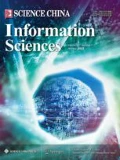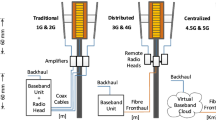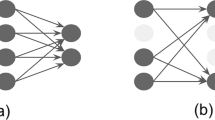Abstract
In this paper, we investigate a user scheduling algorithm for massive multiple-input multiple-output (MIMO) systems over more general correlated Rician fading channels. To achieve low latency and high throughput, a new user scheduling algorithm based on deep learning (DL) is proposed, which exploits only statistical channel state information. The proposed scheduling network is trained to grasp the mapping from the statistical signal and interference pattern to the user scheduling decision through supervised learning. It can predict the optimal scheduling scheme from statistical CSI without iterative calculation after offline training. Simulation results demonstrate the superior performance of the proposed algorithm in terms of calculation time, and it achieves almost the same throughput as the optimal scheduling algorithm which is obtained through exhaustive search. Furthermore, with the normalization of the input data, the proposed scheduling network is robust to the change of the channel environment and the number of transmit antennas.
Similar content being viewed by others
References
Rusek F, Persson D, Lau B K, et al. Scaling up MIMO: opportunities and challenges with very large arrays. IEEE Signal Process Mag, 2013, 30: 40–60
You X H, Pan Z W, Gao X Q, et al. The 5G mobile communication: The development trends and its emerging key techniques (in Chinese). Sci Sin Inform, 2014, 44: 551–563
Wang D M, Zhang Y, Wei H, et al. An overview of transmission theory and techniques of large-scale antenna systems for 5G wireless communications. Sci China Inf Sci, 2016, 59: 081301
Marzetta T L. Noncooperative cellular wireless with unlimited numbers of base station antennas. IEEE Trans Wirel Commun, 2010, 9: 3590–3600
Li X, Liu Z Y, Qin N N, et al. FFR based joint 3D beamforming interference coordination for multi-cell FD-MIMO downlink transmission systems. IEEE Trans Veh Technol, 2020, 69: 3105–3118
Adhikary A, Nam J, Ahn J-Y, et al. Joint spatial division and multiplexing: the large-scale array regime. IEEE Trans Inform Theory, 2013, 59: 6441–6463
Li X, Sun T T, Qin N N, et al. User scheduling for downlink FD-MIMO systems under Rician fading exploiting statistical CSI. Sci China Inf Sci, 2018, 61: 082302
Han Y, Hsu T H, Wen C K, et al. Efficient downlink channel reconstruction for FDD multi-antenna systems. IEEE Trans Wirel Commun, 2019, 18: 3161–3176
Wang T Q, Wen C K, Wang H Q, et al. Deep learning for wireless physical layer: opportunities and challenges. China Commun, 2017, 14: 92–111
Wen C K, Shih W T, Jin S. Deep learning for massive MIMO CSI feedback. IEEE Wirel Commun Lett, 2018, 7: 748–751
He H T, Wen C K, Jin S, et al. Deep learning-based channel estimation for beamspace mmWave massive MIMO systems. IEEE Wirel Commun Lett, 2018, 7: 852–855
He H T, Jin S, Wen C K, et al. Model-driven deep learning for physical layer communications. IEEE Wirel Commun, 2019, 26: 77–83
Goodfellow I, Bengio Y I, Courville A. Deep Learning. Cambridge: MIT Press, 2016
Ye H, Li G Y, Juang B H. Power of deep learning for channel estimation and signal detection in OFDM systems. IEEE Wirel Commun Lett, 2018, 7: 114–117
Xia W C, Zheng G, Zhu Y X, et al. A deep learning framework for optimization of MISO downlink beamforming. IEEE Trans Commun, 2020, 68: 1866–1880
Cui W, Shen K M, Yu W. Spatial deep learning for wireless scheduling. IEEE J Sel Areas Commun, 2019, 37: 1248–1261
Li X, Yu X X, Sun T T, et al. Joint scheduling and deep learning-based beamforming for FD-MIMO systems over correlated Rician fading. IEEE Access, 2019, 7: 118297–118309
Taricco G. Optimum receiver design and performance analysis of arbitrarily correlated Rician fading MIMO channels with imperfect channel state information. IEEE Trans Inform Theory, 2010, 56: 1114–1134
Boukhedimi I, Kammoun A, Alouini M S. Multi-cell MMSE combining over correlated Rician channels in massive MIMO systems. IEEE Wirel Commun Lett, 2020, 9: 12–16
Han Y, Zhang H C, Jin S, et al. Investigation of transmission schemes for millimeter-wave massive MU-MIMO systems. IEEE Syst J, 2017, 11: 72–83
Ioffe S, Szegedy C. Batch normalization: accelerating deep network training by reducing internal covariate shift. In: Proceedings of International Conference on Machine Learning, Lille, 2015. 448–456
He K M, Zhang X Y, Ren S Q, et al. Deep residual learning for image recognition. In: Proceedings of IEEE Conference on Computer Vision and Pattern Recognition, Las Vegas, 2016. 770–778
Acknowledgements
This work was supported by National Natural Science Foundation of China (Grant Nos. 61831013, 61971126, 61941104, 61921004).
Author information
Authors and Affiliations
Corresponding author
Rights and permissions
About this article
Cite this article
Yu, X., Guo, J., Li, X. et al. Deep learning based user scheduling for massive MIMO downlink system. Sci. China Inf. Sci. 64, 182304 (2021). https://doi.org/10.1007/s11432-020-2993-6
Received:
Revised:
Accepted:
Published:
DOI: https://doi.org/10.1007/s11432-020-2993-6




